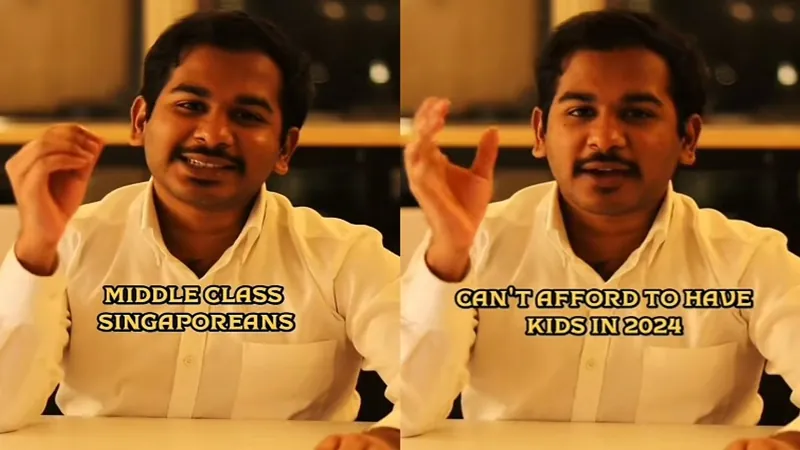
Is Raising a Child in Singapore Becoming Impossible for Middle-Class Families?
2024-11-26
Author: Mei
Singapore: In a startling revelation, financial consultant Devnavin Madeswaran has sparked conversations with his recent TikTok video asserting that middle-class Singaporeans may no longer afford to raise children in 2024.
In the eye-opening three-minute clip, Mr. Madeswaran outlines a grim reality where the costs associated with raising children in Singapore have soared to unsustainable heights. He likens parenting to what he and geopolitical analyst Peter Zeihan describe as an “expensive hobby,” suggesting that only the wealthy can truly afford the associated financial burden.
Historically, having children provided economic advantages, as they could contribute to family work on farms and later support parents into old age. However, the landscape has dramatically changed in urban environments where child-rearing is no longer economically favorable. According to Mr. Madeswaran, many parents recognize that their children are unlikely to provide a financial safety net in their old age, leading to a mindset shift where children are viewed less as assets and more like financial drains.
Rising Costs: An Eye-Watering Statistic
The costs of raising a child in Singapore are staggering. According to data presented by Mr. Madeswaran from financial platform Seedly, one could find themselves spending anywhere from $290,009 to over $360,783 throughout a child's life.
Pregnancy Expenses: $5,055 to $27,001
Infant Costs: $44,113 to $92,941
Toddler Years: Approximately $27,112
Primary School: $68,541
Secondary School: $50,267
Pre-University: $24,876
University: A whopping $69,945
While government assistance helps alleviate some of these costs, Mr. Madeswaran brings attention to "hidden costs," which include anticipated expenses for extracurricular activities, private tuition, and the pressure for children to excel academicaly amidst fierce competition. He cites alarming statistics, such as the fact that 70% of parents in Singapore have turned to private tuition to ensure their children's academic success; among primary school years, this figure skyrockets to 80%.
One told instance revealed a mother who spent $2,000 per term for her daughter’s private tuition. Another shocking case illustrates a mother, with limited educational qualifications, burdened with $60,000 in debt while trying to support her six children.
The Advantage of Wealth
The notion of "super tutors," who reportedly earn up to $1 million annually, illustrates the widening gap between affluent families and the working to middle-class households. These tutors provide significant advantages to wealthy pupils, often leading to better opportunities and placements in top universities, while children from less privileged backgrounds are left at a stark disadvantage.
Highlighting this inequality, Mr. Madeswaran reflects, “The real victims are the kids from poor families who are left with few options.” His concerns raised critical observations about the fairness of a society where educational success is likely tied to income.
In closing, Mr. Madeswaran posed an impactful question to his viewers: Are families simply choosing not to have children due to these financial realities, or does the responsibility to nurture depend on enhancing parenting skills that could level the playing field?
Public Reaction: A Call for Reflection
The response to his video has resonated widely, with many viewers acknowledging the harsh truth revealed. Comments on social media reverberated with sentiments of frustration and helplessness regarding the prospects for children born to low- and middle-income families. One commenter said, “The middle class either makes it or drops to the lower income class,” pointing to the unforgiving structure of socioeconomic mobility.
Others argued for a more balanced perspective, emphasizing that success can still stem from hard work within Singapore's meritocratic system, though acknowledging that financial advantages can tip the scales unavoidably.
This discussion is an important reminder that an increasing number of families face the harsh realities of economic pressures that could lead many to reconsider the prospects of parenthood in Singapore. Is it still feasible for the middle class to raise children in a city where the costs seem to outweigh the benefits?



 Brasil (PT)
Brasil (PT)
 Canada (EN)
Canada (EN)
 Chile (ES)
Chile (ES)
 España (ES)
España (ES)
 France (FR)
France (FR)
 Hong Kong (EN)
Hong Kong (EN)
 Italia (IT)
Italia (IT)
 日本 (JA)
日本 (JA)
 Magyarország (HU)
Magyarország (HU)
 Norge (NO)
Norge (NO)
 Polska (PL)
Polska (PL)
 Schweiz (DE)
Schweiz (DE)
 Singapore (EN)
Singapore (EN)
 Sverige (SV)
Sverige (SV)
 Suomi (FI)
Suomi (FI)
 Türkiye (TR)
Türkiye (TR)